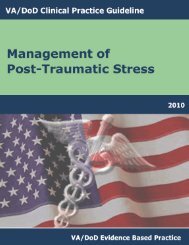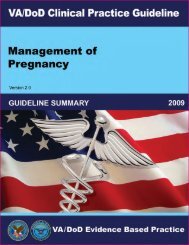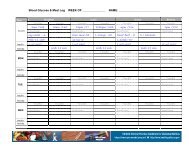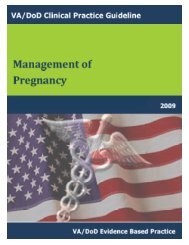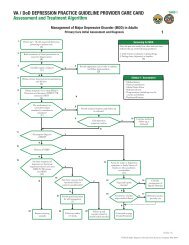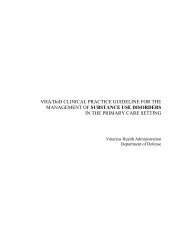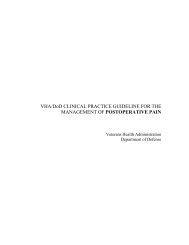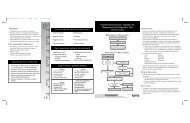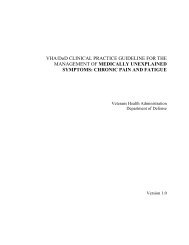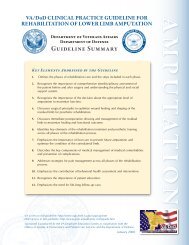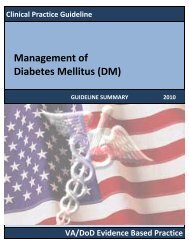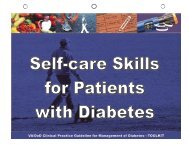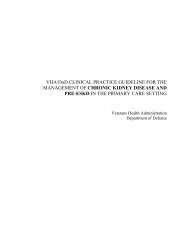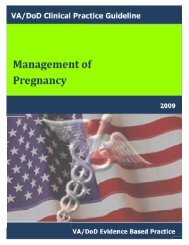DM Full Guideline (2010) - VA/DoD Clinical Practice Guidelines Home
DM Full Guideline (2010) - VA/DoD Clinical Practice Guidelines Home
DM Full Guideline (2010) - VA/DoD Clinical Practice Guidelines Home
You also want an ePaper? Increase the reach of your titles
YUMPU automatically turns print PDFs into web optimized ePapers that Google loves.
Version 4.0<br />
o<br />
Evaluation of the patient’s progress towards the goals<br />
<strong>VA</strong>/<strong>DoD</strong> <strong>Clinical</strong> <strong>Practice</strong> <strong>Guideline</strong><br />
for the Management of Diabetes Mellitus<br />
3. The education component should be tailored to the patient’s needs and provided by healthcare professionals<br />
who are most knowledgeable in the topic. Regardless of setting, availability of a multidisciplinary team<br />
approach is highly desirable and could include, but is not limited to, a dietitian, certified diabetes educator,<br />
registered nurse, pharmacist, psychologist, exercise physiologist, physical therapist, social worker,<br />
endocrinologist, behaviorist, ophthalmologist, optometrist, physician, podiatrist, other healthcare<br />
professionals and paraprofessionals, or other specialized physicians based on the individual patient’s needs.<br />
4. The use of approaches such as group visits and telehealth should be considered in providing education.<br />
DISCUSSION<br />
DSME is the cornerstone of care for all individuals with diabetes who want to achieve successful health-related<br />
outcomes. The National Standards for DSME are designed to define quality diabetes self-management education<br />
that can be implemented in diverse settings and will facilitate improvement in healthcare outcomes (Mensing et al.,<br />
2000). These standards are reviewed and revised approximately every 5 years by key organizations and federal<br />
agencies within the diabetes education community to reflect advances in scientific knowledge and healthcare. The<br />
most recent revision was approved in March 2007 (Funnell et al., 2009) and identified the following as essential<br />
curricula components for DSME:<br />
• Describing the diabetes disease process and treatment options<br />
• Incorporating appropriate nutritional management<br />
• Incorporating physical activity into lifestyle<br />
• Using medications (if applicable) to achieve glycemic targets<br />
• Monitoring blood glucose, monitoring blood or urine ketones (when appropriate), and using the results to<br />
improve control<br />
• Preventing, detecting, and treating acute complications<br />
• Preventing, detecting, and treating chronic complications<br />
• Developing personal strategies to identify and address psychosocial issues and concerns<br />
• Developing personal strategies to promote health and behavior change<br />
• Promoting preconception, pregnancy, and gestational diabetes management when applicable.<br />
While the importance of a multi-disciplinary approach has been demonstrated (Borgermans et al., 2009),<br />
demonstration of the effectiveness of each of the components of a comprehensive program awaits further study.<br />
However, their inclusion is recommended based on expert opinion and research. Because research on educational<br />
interventions is complex, expensive, and time consuming, few studies have addressed the effectiveness of such<br />
programs (Jacobson et al., 1983; Merritt et al., 1983; Miller & Goldstein, 1972; Rubin et al., 1998). Moreover, it is<br />
difficult to assess the unique contribution of education independent of other factors (Colagiuri & Eigenmann, 2009).<br />
Primary care staff members have limited time to provide in-depth education. It is critical, however, to provide<br />
immediate education that will help ensure the patient’s safety until in-depth DSME can be obtained. Appendix M-1:<br />
Core Competencies (Survival Skills) for Patients with Diabetes, details the core competency content.<br />
Several studies have demonstrated the benefits and the limits of self-management training in type 2 diabetes. Ellis et<br />
al. (2004) conducted a systematic review (meta-analysis and meta-regression) of articles published from 1990<br />
through 2000. Twenty-one RCTs with 2439 participants were included. Educational techniques represented included<br />
didactic teaching, dictated goal setting, negotiated goal setting, situational problem solving, cognitive reframing, and<br />
“other” unique teaching methods. The significant heterogeneity notwithstanding, this meta-analysis indicated that<br />
patient education improves glycemic control in patients with diabetes (net change in HbA 1 c was 0.32). Change from<br />
baseline to post intervention HbA 1 c was greater for intervention group and was significant for as long as 52 weeks,<br />
depending upon the type of analysis used. The meta-regression suggests that several attributes of patient education<br />
seem to predict improved glycemic control including face-to-face interaction, cognitive reframing teaching methods,<br />
and programs that integrated an exercise component.<br />
Norris et al., (2001) reviewed a total of 72 studies and reported a positive effect on knowledge, frequency and<br />
accuracy of self-monitoring, self-reported dietary habits, and glycemic control for studies with short follow-up.<br />
Effects on lipids, physical activity, weight, and blood pressure were variable. With longer follow-up, interventions<br />
that used regular reinforcement were sometimes effective in improving glycemic control. No studies demonstrated<br />
the effectiveness of self-management training on cardiovascular morbidity or mortality. The American College of<br />
Physicians (ACP) Journal Club review of the Norris 2001 systematic review noted that DSME is a broad term that<br />
Module M: Self-management Page 109



